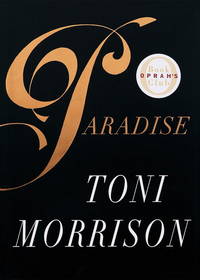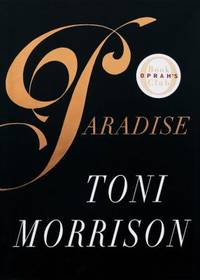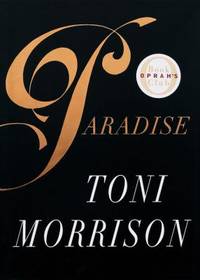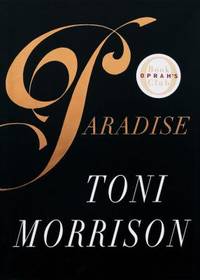Summary
"Rumors had been whispered for more than a year. Outrages that had been accumulating all along took shape as evidence. A mother was knocked down the stairs by her cold-eyed daughter. Four damaged infants were born in one family. Daughters refused to get out of bed. Brides disappeared on their honeymoons. Two brothers shot each other on New Year's Day. Trips to Demby for VD shots common. And what went on at the Oven these days was not to be believed . . . The proof they had been collecting since the terrible discovery in the spring could not be denied: the one thing that connected all these catastrophes was in the Convent. And in the Convent were those women."In Paradise--her first novel since she was awarded the Nobel Prize for Literature--Toni Morrison gives us a bravura performance. As the book begins deep in Oklahoma early one morning in 1976, nine men from Ruby (pop. 360), in defense of "the one all-black town worth the pain," assault the nearby Convent and the women in it. From the town's ancestral origins in 1890 to the fateful day of the assault, Paradise tells the story of a people ever mindful of the relationship between their spectacular history and a void "Out There . . . where random and organized evil erupted when and where it chose." Richly imagined and elegantly composed, Paradise weaves a powerful mystery.From the Hardcover edition.
From the publisher
" Rumors had been whispered for more than a year. Outrages that had been accumulating all along took shape as evidence. A mother was knocked down the stairs by her cold-eyed daughter. Four damaged infants were born in one family. Daughters refused to get out of bed. Brides disappeared on their honeymoons. Two brothers shot each other on New Year's Day. Trips to Demby for VD shots common. And what went on at the Oven these days was not to be believed . . . The proof they had been collecting since the terrible discovery in the spring could not be denied: the one thing that connected all these catastrophes was in the Convent. And in the Convent were those women."
In Paradise--her first novel since she was awarded the Nobel Prize for Literature--Toni Morrison gives us a bravura performance. As the book begins deep in Oklahoma early one morning in 1976, nine men from Ruby (pop. 360), in defense of " the one all-black town worth the pain, " assault the nearby Convent and the women in it. From the town's ancestral origins in 1890 to the fateful day of the assault, Paradise tells the story of a people ever mindful of the relationship between their spectacular history and a void " Out There . . . where random and organized evil erupted when and where it chose." Richly imagined and elegantly composed, Paradise weaves a powerful mystery.
Details
-
Title
Paradise
-
Author
Toni Morrison
-
Binding
Hardcover
-
Edition
First Edition
-
Pages
318
-
Volumes
1
-
Language
ENG
-
Publisher
Alfred A. Knopf, New York
-
Date
1997-12-24
-
ISBN
9780679433743 / 0679433740
-
Weight
1.47 lbs (0.67 kg)
-
Dimensions
9.64 x 6.66 x 1.59 in (24.49 x 16.92 x 4.04 cm)
-
Library of Congress subjects
Historical fiction, African Americans
-
Library of Congress Catalog Number
97080913
-
Dewey Decimal Code
FIC
Excerpt
Excerpted from the Foreword
FOREWORD
The story goes like this. My grandfather attended school for one day in order to tell the teacher he wouldn’t be back because he had to work. His older sister, he said, would teach him to read. It was one of those details that surface in family lore but it wasn’t long before I wondered where was this “school”? He was born in 1864, a year after the Emancipation Proclamation. Where would a school be in the mid-nineteenth century in rural Alabama? In a church basement? Beneath trees out in the woods? Who was this daring, revolutionary teacher? The location would have to be hidden because black people’s access to education in general and reading specifically was violently discouraged and, in most of the South, teaching African Americans to read had been illegal. Virginia law, in 1831, is instructive and representative. “Any white person assembling to instruct free Negroes to read or write shall be fined not over $50.00 also be imprisoned not exceeding two months.” “It is further enacted that if any white person for pay shall assemble with slaves for the purpose of teaching them to read or write he shall for each offense be fined at the discretion of the justice . . .” ten to one hundred dollars. In short, there would be no teaching, paid or unpaid, of free Negroes or slaves without penalty. Any teacher would have to be aware of the risk he or she was taking.
Nevertheless, my grandfather’s sister was successful because against all odds, he did become literate. The next question was how would he use that skill? What was there for him to read? Books on that poor little farm in Greenville, Alabama? Unlikely. Library? Certainly not. But there was one book available: the Bible. Which is why, I suppose, that among his legendary accomplishments was his boast that he had read the King James Version of the Bible cover to cover five times.
Reading and script writing were prized in my family not only for information and pleasure but also as a defiant political act since historically so much effort had been used to keep us from learning. My mother joined the Literary Guild in the 1940s.We subscribed to newspapers devoted exclusively to African American news and opinions. Issues of The Pittsburgh Courier and the Cleveland Call and Post were worn to shreds with multiple readings and readers. Like other ethnic newspapers ours elicited passionate commentary, questions, argument. We poured over J. A. Rogers’ work, Du Bois’ Souls of Black Folk and whatever we could find that encouraged and informed us about being black in America.
It was inevitable, therefore, that when I edited The Black Book, a complex record of African American life that I solicited from collectors, the earliest newspapers would fascinate me, especially the “colored” ones. There, in photographs and print so much African American history— sad, ironic, resistant, tragic, proud, and triumphant— was on display. Of particular interest were those printed in the nineteenth century when my grandfather spent his few minutes at school. I learned there were some fifty black newspapers produced in the Southwest following Emancipation and the violent displacement of Native Americans from Oklahoma Territory. The opportunity to establish black towns was as feverish as the rush for whites to occupy the land. The “colored” newspapers encouraged the rush and promised a kind of paradise to the newcomers: land, their own government, safety— there were even sustained movements to establish their own state.
One theme in particular in those papers intrigued me. Prominent in their headlines and articles was a clear admonition: Come Prepared or Not at All.
Implicit in those warnings were two commands: 1) If you have nothing, stay away. 2) This new land is Utopia for a few. Translation: no poor former slaves are welcome in the paradise being built here. What could that mean for ex- slaves— threatened, exhausted refugees with no resources? How would they feel having trekked all that way from chains into freedom only to be told, “This here is Paradise but you can’t come in.” I also noticed that the town leaders in the photographs
were invariably light- skinned men. Was skin privilege also a feature of the separation? One that replicated the white racism they abhorred?
I wanted to dig into these matters by exploring the reverse; exclusivity by the very black- skinned; construction of their very own “gated community,” one that refused entrance to the mixed race. Considering the need for progeny in order to last, how would patriarchy play and how might matriarchy threaten? In order to describe and explore these questions I needed 1) to examine the definition of paradise, 2) to delve into the power of colorism, 3) to dramatize the conflict between patriarchy and matriarchy, and 4) disrupt racial discourse altogether by signaling then erasing it.
The idea of paradise is no longer imaginable or, rather, it is over-imagined, which amounts to the same thing— and has therefore become familiar, commercialized, even trivial. Historically, the images of paradise in poetry and prose were intended to be grand but accessible, beyond the routine but imaginatively graspable, seductive as though remembered. Milton speaks of “goodliest trees, loaden with fairest fruit, Blossoms and fruits at once of golden hue . . . with gay enameled colours mixed . . . ; of Native perfumes.” Of “that sapphire fount the crisped brooks, Rolling on orient pearl and sands of gold . . .” of “nectar visiting each plant, and fed flowers worthy of Paradise . . .Groves whose rich trees wept odorous gums and balm; Others whose fruit, burnished with golden rind, Hung amiable, . . . of delicious taste. Betwixt them lawns, or level downs, and flocks Grazing the tender herb.” “Flowers of all hue and without thorn the rose.” “Caves of cool recess, o’er which the mantling vine Lays forth her purple grape and gently creeps Luxuriant . . .”
That beatific, luxurious expanse we recognize in the twenty- first century as bounded real estate owned by the wealthy and envied by the have- nots, or as gorgeous parks visited by tourists. Milton’s Paradise is quite available these days, if not in fact certainly as ordinary, unexceptionable desire. Modern paradise has four of Milton’s characteristics: beauty, plenty, rest, exclusivity. Eternity seems to be forsworn.
Beauty is benevolent, controllable nature combined with precious metal, mansions, finery, and jewelry.
Plenty in a world of excess and attending greed, which tilts resources to the rich and forces others to envy, is an almost obscene feature of a contemporary paradise. In this world of outrageous, shameless wealth squatting, hulking, preening before the dispossessed, the very idea of “plenty” as Utopian ought to make us tremble. Plenty should not be understood as a paradise- only state, but as normal, everyday, humane life.
Rest that is the respite from labor or fighting for rewards or luxury has dwindling currency these days. It is a desire- less- ness that suggests a special kind of death without dying. Rest can suggest isolation, a vacation without pleasant or soothing activity. In other words, punishment and/or willful laziness.
Exclusivity, however is still an attractive, even compelling feature of paradise because so many people— the unworthy— are not there. Boundaries are secure, watchdogs, security systems, and gates are there to verify the legitimacy of the inhabitants. Such enclaves separate from crowded urban areas proliferate. Thus it does not seem possible or desirable for a city to be envisioned let alone built in which poor people can be accommodated. Exclusivity is not just a realized dream for the wealthy; it is a popular yearning of the middle class. “Streets” are understood to be populated by the unworthy, the dangerous. Young people strolling are understood to be prowling the streets and up to no good. Public space is fought over as if it were private. Who gets to enjoy a park, a beach, a street corner? The term “public” is itself a site of contention.
Eternity, which avoids the pain of dying again, is rendered null by secular, scientific arguments; yet it has nevertheless the greatest appeal. Medical and scientific resources are directed toward more life and fitter life and remind us that the desire is for earthbound eternity, rather than eternal afterlife. The implication being that this is all there is.
Thus, paradise, as an earthly project as opposed to a heavenly one has serious intellectual and visual limitations. Aside from “Only me or us forever” heavenly paradise hardly bears mention.
But that might be unfair. It is hard not to notice how much more attention is given to hell rather than heaven. Dante’s Inferno beats out Paradisio every time. Milton’s brilliantly rendered pre- paradise world, known as Chaos, is far more fully realized than his Paradise. The visionary language of the doomed reaches heights of linguistic ardor with which language of the blessed and saved cannot compete. There were reasons for the images of the horrors of hell to be virulently repulsive in the fifteenth and sixteenth centuries. The argument for avoiding hell needed to be visceral, needed to reveal how much worse such an eternity was than the hell of everyday life. That was when paradise was simply the absence of evil— an edgeless already recognizable landscape: great trees for shade and fruit, lawns, palaces, precious metals, animal husbandry, and jewelry. Other than outwitting evil, waging war against the unworthy, there seems to be nothing for the inhabitants of paradise to do. An open, borderless, come-one-come-all paradise, without dread, minus a nemesis is no paradise at all.
Notable in Milton’s Paradise is the absence of women. Eve alone is given the most prominent space in that place. Progeny apparently is not required since there will always be more blessed to enter. Also, besides care-taking, what is there for women to do?
Because the paradise the black newspapers envisioned not so subtlety encouraged light- skinned applicants, a major excitement for me in writing Paradise was an effort to disrupt the assumptions of racial discourse. I was eager to manipulate, mutate and control imagistic, metaphoric language in order to produce something that could be called race- specific/race- free prose, language that deactivated the power of racially inflected strategies— transform them from the straitjacket a race- conscious society can, and frequently does, buckle us into— a refusal to “know” characters or people by the color of their skin. One of the most malevolent characteristics of racist thought is that it never produces new knowledge. It seems able to merely reformulate and refigure itself in multiple but static assertions. It has no referent in the material world, like the concept of black blood or white blood or blue blood, it is designed to construct artificial borders and maintain them against all reason and all evidence to the contrary. And while racist thought and language have an almost unmitigated force in political and social life, the realm of racial difference has been allowed an intellectual weight to which it has no claim. It is truly a realm that is no realm at all— an all- consuming vacancy that is both common and strange.
Material relating to the black towns founded by African Americans in the nineteenth century provided a rich field for an exploration of race- specific/race- free language. I am aware of how whiteness matures and ascends the throne of universalism by maintaining its powers to describe and enforce its descriptions. To challenge that view of universalism, to exorcise, alter, and de- fang the white/black confrontation and concentrate on the residue of that hostility seemed to me a daunting project and an artistically liberating one.
“They shoot the white girl first. With the rest they can take their time.”
With these opening sentences I wanted to signal 1) the presence of race as hierarchy and 2) its collapse as reliable information. The novel places an all- black community, one chosen by its inhabitants, next to a raceless one, also chosen by its inhabitants. The grounds for traditional black vs. white hostilities shift to the nature of exclusion, the origins of chauvinism, the sources of oppression, assault, and slaughter. The black town of Ruby is all about its own race— preserving it, developing myths of origin, and maintaining its purity. In the Convent race is indeterminate— all racial codes are eliminated, deliberately withheld. For some readers this was disturbing and some admitted to being preoccupied with finding out which character was the “white girl”; others wondered initially and then abandoned the question; some ignored the confusion by reading them all as black. The perceptive ones read them as fully realized individuals— whatever their race. Unconstrained by the weary and wearying vocabulary of racial domination, the narrative seeks to un-encumber itself from the limit that racial language imposes on the imagination. The conflicts are gender- related and generational. They are struggles over history— who will tell and thereby control the story of the past? Who will shape the future? There are conflicts of value, of ethics. Of personal identity. What is manhood? Womanhood? And finally what is personhood?
Raising these questions seemed most compelling when augmented by yearnings for freedom and safety; for plenitude, for rest, for beauty; by the search for one’s own space, for respect, love, bliss— in short, how to re-imagine paradise. Not the “Come Prepared or Not at All” command to make sure you get a ticket before you enter a theme park; but an interrogation into the narrow imagination that conceived and betrayed paradise.
We called him Big Papa. He stood in the vegetable garden peeling a yam with his pocketknife. Then he ate the raw slices slowly, carefully. If he wanted the chair you were in, he stood there, silent, looking at the sitter until you got the message and got up. He was too religious for any church. He drew pictures of my sister and me and gave us the gift of chewing gum. Wherever he was— on the porch, at the kitchen table, in the garden, in the living room reading— that’s where the power and deference were. He didn’t exert power; he assumed it. And it was in part from knowing him that I felt I could understand and create the men in Ruby— their easy assumption of uncontested authority.
Big Papa. A survivor. Eccentric, formidable, playful, stubborn, learned.
He left me his violin.
—Toni Morrison
Media reviews
“Morrison has brought it all together: the poetry, the emotion, the broad symbolic plan.” —The New York Times Book Review
“Stunning. . . . Morrison at her novelistic best.” —The New Yorker
“Morrison dazzles.” —The Nation
“A fascinating story, wonderfully detailed. . . . The town is the stage for a profound and provocative debate.” —Los Angeles Times
“Morrison [is] a master storyteller. . . . She is at the height of her imaginative powers.” —New York Daily News
“Everything is resonant here: the most casual gestures are informed by the facts and myths of genders and race, by our notions of civilization and lawlessness, body and spirit, Christianity and witchcraft. Morrison’s lyrical prose displays great confidence in her readers’ intelligence, demands their unflagging attention, and rewards them generously—with a memorable work of epic range and monumental ambition.” —People
“Toni Morrison is an extraordinarily good writer. Two pages into anything she writes one feels the power of her language and the emotional authority behind that language.” —The Village Voice
“Morrison is at the top of her form. . . . Impressive, eloquent, and powerfully imagined.” —The Baltimore Sun
“Morrison is a terrific storyteller. . . . Her writing evokes the joyful richness of life.” —Newsday
“A breathtaking, risk-taking major work that will have readers feverishly, and fearfully turning the pages.” —Kirkus Reviews
“[A] triumph. . . . The individual stories of both the women and the townspeople reveal Morrison at her best.” —Publishers Weekly (starred)
About the author
Toni Morrison is Robert F. Goheen Professor at Princeton University. She has written six previous novels, and has received the National Book Critics Circle Award and the Pulitzer Prize. She won the Nobel Prize for Literature in 1993.











